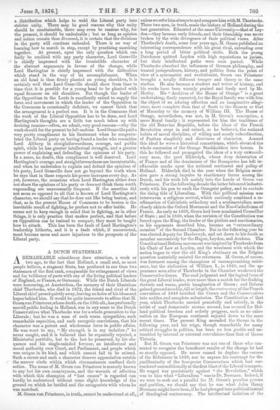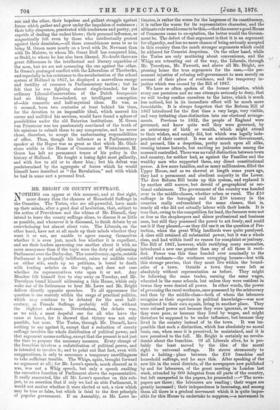A DUTCH STATESMAN.
A REMARKABLE coincidence drew attention, a week or 11 two ago, to the fact that Holland, a small and, as most people believe, a stagnant State, has produced in our time two statesmen of the first rank, comparable for enlargement of views and for brilliancy of parts with any of the living political leaders of England, or France, or Germany. While the Dutch Liberals were honouring, at Amsterdam, the memory of their illustrious chief Thorbecke, who died in 1872, the friend and rival of the Liberal chief passed quietly away, leaving no heirs of his ideas and hopes behind him. It would be quite inaccurate to affirm that M. Green van Prinsterer,whose death, on the 19th ult., has profoundly moved public feeling in Holland, was in any sense to the Dutch Conservatives what Thorbecke was for a whole generation to the Liberals ; but he was a man of such warm sympathies, such remarkable capacities, and such energetic convictions, that his character was a potent and wholesome force in public affairs. He was wont to say, "My strength is in my isolation ;" he never sought, and it is believed that he repeatedly rejected, a Ministerial portfolio, but to the last he preserved, by his elo- quence and his single-minded fervour, an intellectual and moral authority over Court, and Parliament, and people which was unique in its kind, and which cannot fail to be missed. Such a career and such a character deserve appreciation outside the narrow circle within which circumstances confined their action. The name of M. Groen van Prinsterer is scarcely known to any but his own countrymen, and the warmth of affection with which this champion of "lost causes" is regarded can hardly be understood without some slight knowledge of the ground on which he battled and the antagonists with whom he was matched.
M. Groen van Prinsterer, in truth, cannot be understood at all, unless we refer him always to and compare him with M. Thorbecke. These two men, in truth, made the history of Holland during the last generation. Educated at the same University—that of Ley- den—they became early friends, and their friendship was never broken by the wide divergence of their political views. After Thorbecke's death, some four years ago, M. Groan published an interesting correspondence 3vith his great rival, extending over a long period of bitter political strife. Both the young Dutchmen quitted Leyden with high reputations as jurists, but their intellectual paths were soon parted. While Thorbecke absorbed the influences of German philosophy, and treated jurisprudence, history, and politics from the point of view of a systematist and evolutionist, Groan van Prinsterer brought a totally different temper and theory to the same studies. He also became a student and writer of history, and his works have been warmly praised and freely used by Mr. Motley. His "Archives of the House of Orange" is a great undertaking, finely executed, for the Royal family was with him the object of an adoring affection and an imaginative allegi- ance more complete than that of Scott to the Stuarts or that of Macaulay to the memory of William III. The House of Orange, nevertheless, was not, in M. Green's conception, a mere Royal family • it represented for him the traditions of the old Batavian Republic, before the ideas of the French Revolution crept in and ruined, as he believed, the national habits of moral discipline, of willing and manly subordination, of Puritan simplicity and directness of character. Around this ideal he wove a historical romanticism, which elevated the whole succession of the Orange Stadlholders into heroes. In this he followed and propagated the ideas of a very extraordi- nary man, the poet Bilderdyk, whose deep detestation of of France and of the dominance of the Bonapartes has left in- effaceable marks upon the national sentiment and policy of Holland. Bilderdyk died in the year when the Belgian seces- sion gave a strong impulse to reactionary forces among the Dutch, and his work fell mainly into the hands of Groen van Prinsterer. For the foltowing decade the latter laboured industri- ously with his pen to exalt the Oraaigeist policy, and to exclude the rising tide of Liberalism. With this political mission was interwoven a religious revival, which curiously combined a re- affirmation of Calvinistic orthodoxy and a sentimentalism more closely akin to the Oxford Movement and the Neo-Catlaolichnu of France. As early as 1836, Groan had been nominated Councillor of State ; and in 1840, when the revision of the Constitution was forced upon the King, the leader of the pietists and reactionaries, as his opponents described him, became an "extraordinary member" of the Second Chamber. But in the following year he was elected deputy for Harderwyk, and sat down to his death as member successively for the Hague, Leyden, and Arnhem. The Constitutional Reform movement was inspired by Thorbecke from his Chair of Law at Leyden, and the weariness with which the nation began to view the old King's obstinacy on the Belgian question materially assisted the reformers. M. Groen, of course, was foremost among the champions of uncompromising resist- ance, but the abdication of William I., in 1840, and the ap- pearance soon after of Thorbecke in the Chamber weakened the Conservative forces. The cool judgment and the logical foroe of the great Liberal leader, were more than a match for the flashing rhetoric and warm poetic imagination of Groen ; and Reform gained ground steadily, till at length the contre-coup of the French convulsion of 1848 terrified the Crown and the Conservatives into sudden and complete submission. The Constitution of that year, which Thorbecke carried peacefully and soberly, in the midst of mad democratic storms around, has secured for Hol- land political freedom and orderly progress' such as no other nation on the European continent enjoyed down to the most recent times. The present King ascended the throne in the following year, and his reign, though remarkable for many critical struggles in politics, has been no less pacific and un- troubled by internal or external convulsions than that of Queen Victoria.
But M. Groan van Prinsterer was not one of those who con- sented to recognise the beneficent results of the change he had so stoutly opposed. He never ceased to deplore the success of the Reformers in 1848, nor to express his contempt for the pusillanimity of the bourgeoise Conservatism which had sur- rendered unconditionally at the first blast of the Liberal trumpets. He waged war persistently against "the Revolution," which was to him what "Liberalism" was to Dr. Newman. Indeed, if we were to seek out a parallel for M. Groan's peculiar powers and position, we should say that he was what John Henry Newman might have been, if he had plunged into politic,aliustead of theological controversy. The intellectual isolation of the one and the other, their hopeless and gallant struggle against forces which gather and grow under the impulsion of resistance ; their lofty eloquence, penetrated with tenderness and poetry, yet capable of dealing the rudest blows ; their personal influence, so magnetically felt even by those who intellectually protest against their dominion,—all these resemblances seem to us to bring M. Groen more nearly on a level with Dr. Newman than with De Maistre, to whom Mr. Grant Duff has compared him, or Stahl, to whom he has also been likened. No doubt there are great differences in the intellectual and literary capacities of the men, but we are not measuring the one against the other. In Groen's prolonged conflict with the Liberalism of Thorbecke, and especially in his resistance to the secularisation of the school system of Holland in 1857, he displayed a marvellous energy and fertility of resource in Parliamentary tactics ; but he felt that he was fighting almost single-handed, for the ordinary Liberal-Conservatism of the Dutch bourgeoisie had no liking for—indeed, no intelligent conception of—his romantic and half-mystical ideas. He was, as it seemed, born two centuries at least behind his time, for the devotion to an impossible ideal, which marred his career and nullified his services, would have found a sphere of possibilities under the old Batavian institutions. M. Groen van Prinsterer was too passionately convinced of the truth of his opinions to submit them to any compromise, and he never chose, therefore, to accept the embarrassing responsibilities of office. Thus though his influence as a Parliamentary speaker at the Hague was as great as that which Mr. Glad- stone wields in the House of Commons at Westminster, M. Groen has left no permanent traces of his policy in the history of Holland. He fought a losing fight most gallantly, and with few to aid or to cheer him ; but his defeat was predetermined by the aggregate of forces which he would himself have described as "the Revolution," and with which he had hi some sort a personal feud.































 Previous page
Previous page